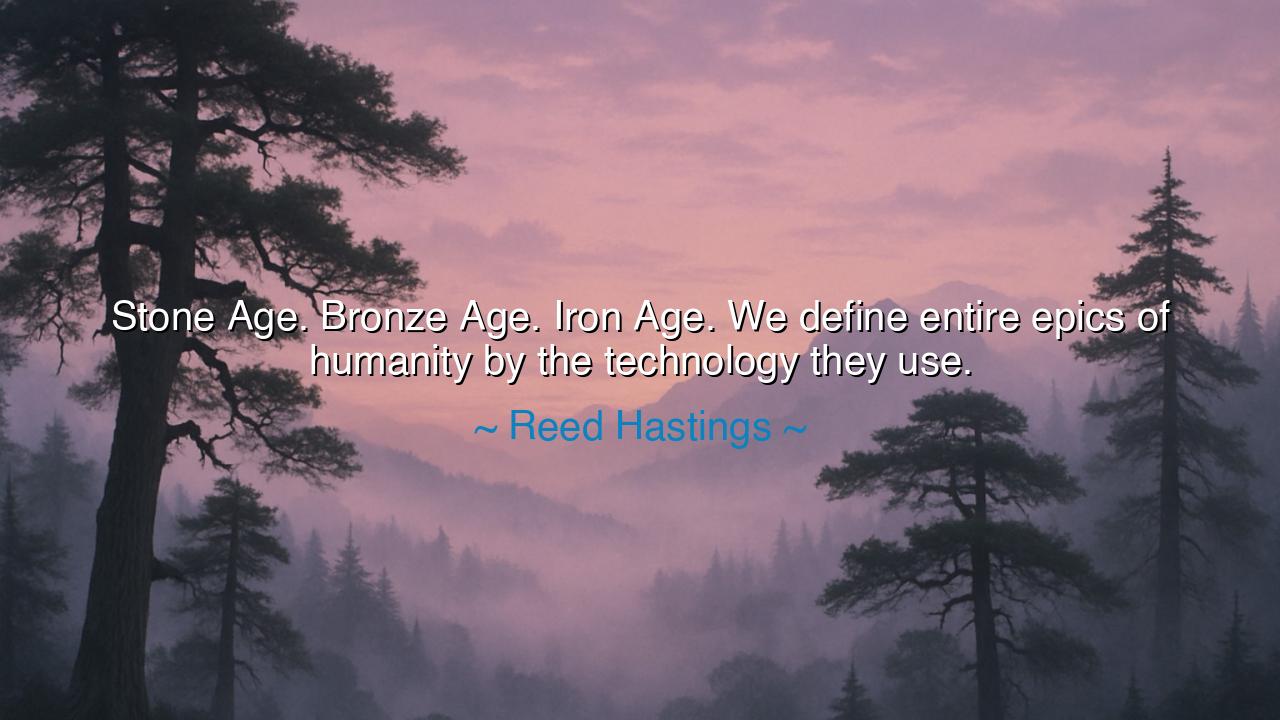
Stone Age. Bronze Age. Iron Age. We define entire epics of
Stone Age. Bronze Age. Iron Age. We define entire epics of humanity by the technology they use.






In the grand sweep of human history, certain eras are defined not by the rulers who reigned or the battles fought, but by the technological advancements that shaped the lives of those who lived within them. Reed Hastings, in his powerful words, reminds us: "Stone Age. Bronze Age. Iron Age. We define entire epics of humanity by the technology they use." With these words, Hastings speaks to a profound truth about how human progress is intertwined with the tools we create. It is not merely the passing of time or the rise and fall of empires that mark the epochs of humanity, but the innovations that transform the very way we live, work, and engage with the world. From the simplest stone tools to the might of iron, and the creation of technologies that are yet to come, it is these innovations that leave their mark on history.
The ancients understood the significance of technology in shaping civilization. The Greek philosopher Plato recognized the power of tools in crafting a just society. In his ideal city, the creation of tools—whether in agriculture, construction, or warfare—was directly tied to the flourishing of society. For Plato, the advancement of technology was not merely a means of achieving power, but a means of achieving order and harmony in human life. In this, he foreshadowed what Hastings articulates: the technological shifts of any era are often the most significant drivers of change. It is through the evolution of our tools that we redefine the very nature of existence.
Take, for example, the Bronze Age, a time when the discovery of bronze revolutionized tools, weaponry, and agriculture. The people of this era were able to craft stronger tools, allowing them to build empires and expand trade networks that were once unimaginable. The creation of bronze did not simply alter the tools they used—it transformed society itself, making possible the construction of cities, the development of armies, and the spread of ideas. The Bronze Age was not just a chapter in history; it was a redefinition of what was possible for mankind. The same can be said of the Iron Age, where iron tools and weapons allowed for greater expansion, innovation, and complexity in every aspect of life. Hastings reminds us that these shifts are not just technical; they are the very foundation upon which new societies, economies, and ways of thinking are built.
The Industrial Revolution is another powerful example of how technology can redefine the course of history. The invention of the steam engine, the mechanization of agriculture, and the rise of factories changed the fabric of society in ways that would have seemed impossible just a generation before. Cities grew rapidly, global trade flourished, and the very nature of work and labor was altered. The Industrial Revolution was not just a shift in the methods of production; it was a revolution in the human experience itself. Just as the Bronze Age marked the dawn of new possibilities, the Industrial Revolution marked a new chapter in human history, shaping modern capitalism, urbanization, and even culture. Hastings' statement reflects this truth—that technology is the true measure of an era's significance.
But even as we look at history, we find that technology’s influence is not always linear or predictable. The Information Age, for example, has brought about profound changes in how we communicate, interact, and organize our societies. With the rise of the internet, computers, and smartphones, we have entered a new era where information itself is the driving force behind progress. Yet, as we navigate these changes, we must ask ourselves: How will the technologies of today shape the future? Just as the Stone Age gave way to the Bronze Age, and the Iron Age paved the way for the Industrial Revolution, will the digital revolution birth new technologies that will define the next phase of humanity?
The lesson we must take from Hastings' words is that technology is not just a tool; it is the very force that drives the course of human progress. From the simplest stone tools to the digital age, we are constantly shaping our world through the innovations we create. Technology is not just something we use; it is something that defines who we are, where we are headed, and what we can achieve. As humankind continues to evolve, it is essential that we remain mindful of the tools we create, and how they will shape the future.
In our own lives, we must actively engage with the technologies of our time, using them not just to survive, but to thrive. Let us embrace the tools at our disposal, but also question how they will influence our societies, our relationships, and our future. Just as the Bronze Age reshaped human civilization, and the Industrial Revolution changed the very fabric of life, we have the power to shape the course of the Information Age. Let us not merely be consumers of technology but creators of a future that honors and enhances the human experience. Technology, when guided by wisdom and purpose, is not merely a tool—it is the architect of our future.






AAdministratorAdministrator
Welcome, honored guests. Please leave a comment, we will respond soon